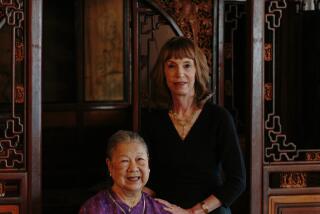Shanghai Stage Gets a Jolt of Past Glory
- Share via
SHANGHAI — Beijing has long dominated China’s theater scene. But now a Shanghai troupe has staged a play here that is quintessentially Beijing in content and quality. The sold-out performances marked a potential turning point for this commercial mecca that wants desperately to be the nation’s artistic capital.
“Under the Red Banner” is based on the unfinished autobiography of Lao She, one of China’s favorite literary sons. Much of the late Manchurian-born author’s writing captured life during the dying Qing Dynasty at the beginning of the 20th century. His style is grounded in the dialect and culture of old Beijing. Some of his best-known works, such as “Teahouse” and “Rickshaw Boy,” were made into movies in his homeland and have been read in translation around the world.
Large historical dramas of the caliber of Lao She’s are typically considered the domain of Beijing-based companies. But the Shanghai Drama Arts Theater took on the autobiography, which was turned into a play by Li Longyun in 1999, after an established Beijing troupe reportedly turned it down. Organizers here felt that it was just the right production to open Shanghai’s new theater and would show that the city is serious about reviving its image as an artistic stronghold.
People who saw the show say what the Shanghai actors lacked in linguistic authenticity they more than made up for in presentation. Audiences loved the first-rate cast and the spectacular set, which included a movable pond and a wall that transformed from windows and doorways to rubble.
“It’s a major breakthrough, and Shanghai should be very proud,” said Shu Yi, Lao She’s 65-year-old son, who wept when the character playing his father delivered his final soliloquy in a pool of water. “I never imagined it would be this moving, this successful.”
The scene is significant because Lao She drowned himself in a Beijing lake in 1966. Red Guards of the Cultural Revolution had attacked him as a counterrevolutionary. They paraded him through the streets and beat him in public. His relatives were accused of implication in his “crimes” but continued to rescue his manuscripts after his death, hiding them in coal piles and a chimney and moving them from house to house.
The red banner in the play’s title is a reference not to communism but to the Manchurian army, with which Lao She’s father served as a soldier. The father died defending Beijing, the Qing Dynasty’s imperial city, against foreign invaders. Though Lao She envisioned the autobiography as one of his finest works, he was forced to abandon it in the early 1960s after sketching out the main characters and themes.
“It was supposed to be an epic like ‘Dream of the Red Chamber,’ ” said Lao She’s son, referring to another Chinese historical masterpiece. “He loved what he had written. He often read it out loud to friends for feedback.”
Many Chinese believe that Lao She was short-listed to win the Nobel Prize in 1968. But the award was given to the only other Asian nominee that year, Yasunari Kawabata of Japan, after the judges reportedly found out that Lao She had died and was therefore disqualified. Last year, exiled writer Gao Xingjian became the first Chinese to win the coveted prize.
Back in the 1930s, Shanghai was very much a refuge for China’s literary luminaries. But the port city lost that status over time to Beijing.
“In Chinese literature, there is a distinct north and south divide,” said Ye Xin, vice chairman of the Shanghai Writers Assn. “If the production could make Lao She’s son cry, it shows the Shanghai actors deeply absorbed the strength of the Beijing school of acting.”
Additional performances of “Under the Red Banner” have been added in Shanghai, and the company plans to take it on the road--including to Beijing.
More to Read
The biggest entertainment stories
Get our big stories about Hollywood, film, television, music, arts, culture and more right in your inbox as soon as they publish.
You may occasionally receive promotional content from the Los Angeles Times.










